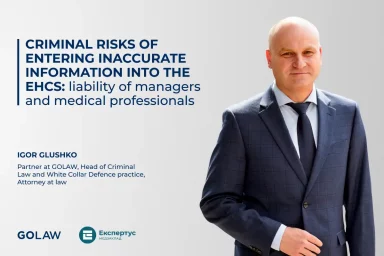Is the prosecutor entitled to appeal against the judgment approving a plea agreement on a corruption offense: Supreme Court legal opinion
Plea agreements allow the judicial system to retain resources while entailing serious consequences for the parties. A suspect or accused waives the rights guaranteed by Article 42 of the Criminal Procedural Code of Ukraine (hereinafter – CPC of Ukraine), including the right not to testify against himself, and the prosecutor is released from the obligation to prove guilt in court.
However, the right to appeal a judgment rendered in criminal proceedings based on agreements is also restricted.
The Grand Chamber of the Supreme Court (hereinafter – the GC of the SC) in case No. 947/10464/21 dated 29/03/2023 has recently confirmed that the list of legal grounds for appealing against the judgment of the first-instance court approving the plea agreement is exhaustive.
The essence of the criminal proceedings lies in the accusation against the person of committing a criminal offense under part 1 of Article 369 of the Criminal Code of Ukraine (hereinafter – CC of Ukraine). During the trial, the first-instance court approved the plea agreement. Under Article 75 of the CC of Ukraine, the defendant has been discharged from punishment on probation for two years with obligations under Article 76 of the CC of Ukraine.
The prosecutor has filed an appeal against this judgment, arguing that it constituted a significant non-compliance with the requirements of the criminal procedure, which resulted in the unjustified and illegal decision to approve the agreement. According to the prosecution, the first-instance court should have confirmed the compliance of the plea agreement with the requirements of the CC of Ukraine and the CPC of Ukraine and refused to approve the agreement under para 1 of part 7 of Article 474 of the CPC of Ukraine because the punishment agreed upon by the parties did not comply with the requirements of Article 45 and part 1 of Article 75 of the CC of Ukraine.
However, the appellate court denied to open the appeal proceedings under para 4 of Article 394 of the CPC of Ukraine, and the prosecutor challenged the first-instance court’s judgment and the court of appeals’ ruling to the Supreme Court and eventually submitted them to the GC of the SC.
Two issues have been put to the GC of the SC for consideration, which outline the essence of the problem:
- May (should) the court approve a plea agreement (or reconciliation agreement) in criminal proceedings on a corruption offense, one of the conditions of which is the discharge of an offender from punishment on probation under Article 75 of the CC of Ukraine in view of parts 1 and 2 of Article 75 of the CC of Ukraine?
- Is the prosecutor entitled to appeal against this judgment considering para 2 of part 4 of Article 394 of the CPC of Ukraine and the general principles of criminal proceedings if the court does not have the right to approve such an agreement but has rendered so?
Under para 1 of part 1 of Article 392 of the CPC of Ukraine, the first-instance court’s judgment that has not entered into force may be appealed against. It does not apply to cases under Article 394 of the CPC of Ukraine when the prosecutor appeals against the judgment based on a plea agreement on other grounds than the court imposing a sentence less severe than that agreed upon between the parties to the agreement and the court approves this agreement in proceedings, in which under part 4 of Article 469 of CPC of Ukraine it cannot be concluded.
The scope and grounds for appealing the judgment of the first-instance court based on the plea agreement are exhaustive.
Therefore, the GC of the SC has concluded that the prosecutor filed an appeal against the judgment on the grounds that it could not be challenged under para 2 of part 4 of Article 394 of the CPC of Ukraine. Nevertheless, the court of appeals correctly refused to open proceedings under part 4 of Article 399 of the CPC of Ukraine.
Thus, the prosecutor is deprived of the right to appeal against the judgment of the first-instance court, which approved the plea agreement with the condition of discharge from punishment on probation in criminal proceedings on a corruption offense.
As for the legality of the first-instance court’s judgment approving the plea agreement in the criminal proceedings on a corruption offense, considering parts 1 and 2 of Article 75 of the CC of Ukraine, it remains unresolved.
According to the resolution of the Supreme Court, two approaches to the interpretation and application of these legal provisions have been developed in practice.
The first approach is that part 1 of Article 75 of the CC of Ukraine establishes a general prohibition of discharge from punishment on probation in criminal proceedings on corruption offenses, which also applies to the approval of plea agreements.
The second approach is based on the standpoint that part 2 of Article 75 of the CC of Ukraine contains a separate rule, which is immune to the restriction on discharge from punishment on probation in corruption offenses under part 1 of this Article. Thus, in case of approval of a plea agreement, the court must decide to discharge a person from punishment, even when it regards a corruption offense.
However, the GC of the SC did not decide which approach is correct. The cassation proceedings have been closed due to the absence of authority of the court to review and of the prosecutor to appeal against a judgment, which the appellate court has not reviewed.
Find more insights, legal positions and practical guidance on Criminal Law in Ukraine at 👇

Kristina Kolchynska
Counsel, Attorney at Law
- Contacts
- 31/33 Kniaziv Ostrozkykh St, Zorianyi Business Center, Kyiv, Ukraine, 01010
- k.kolchynska@golaw.ua
- +38 044 581 1220
Sign up to be aware
New achievements are inspired by information. GO further, don’t miss out GOLAW news and legal alerts
Our expertise
-
- Energy and Natural Resources
- Antitrust and Competition
- Banking and Finance
- Compliance, Corporate Governance and Risk Management
- Corporate and M&A
- Criminal and White Collar Defence
- Defense in Anti-corruption procedures and regulations
- Digital Economy Practice
- Labor and Employment
- Natural Resources and Environment
- Government Relations (GR)
- Insolvency and Corporate Recovery
- Intellectual property
- International trade
- Legal support of business and private Сlients in Germany
- Litigation and dispute resolution
- Private clients
- Real Estate and Construction
- Restructuring, Claims and Recoveries
- Martial Law
- Tax and Customs
-
- Agribusiness
- Aviation
- Chemical industry
- Engineering, Construction and Building Materials
- Environment and Natural Resources
- Financial institutions
- IT and AI
- Industry and manufacturing
- Healthcare industries, Life sciences and Pharmaceuticals
- Media, Entertainment, Sports and Gambling
- Retail, FMCG and E-Commerce
- Transport and Logistics
We use cookies to improve performance of our website and your user experience.
Cookies policy
Cookies settings







